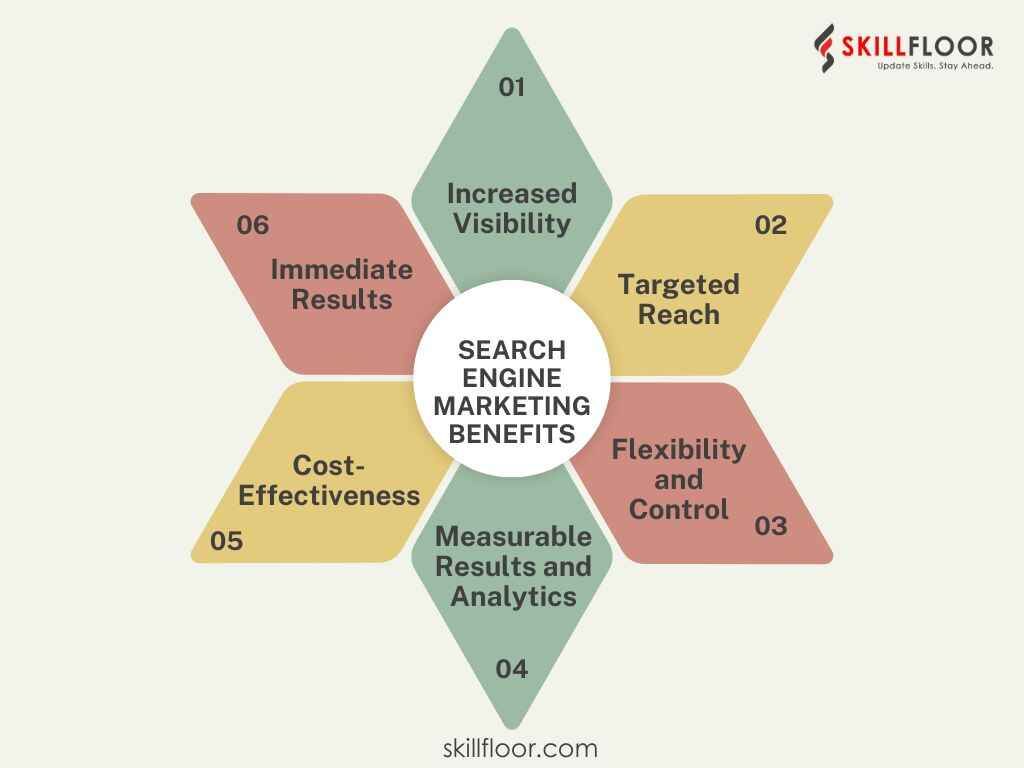The benefits of search engine marketing
Learn how search engine marketing (SEM) can boost your online visibility and attract the right audience with targeted ads.

When a company wants to increase its online presence and get targeted traffic to its website, Search Engine Marketing (SEM) is a vital resource. SEM guarantees instant involvement on search engine results pages (SERPs), boosting brand awareness and generating leads from the start by carefully selecting keywords and demographics. SEM gives demonstrable results with its affordable pay-per-click strategy and strong analytics, enabling companies to maximize the impact of their campaigns in real time. In today's competitive digital environment, businesses may build a strong online presence, successfully reach their target audience, and achieve their marketing objectives by combining SEM with SEO efforts.
Consider a little online store that specializes in one type of jewelry handcrafted. They rely only on social media for promotion in the beginning. Nevertheless, they have trouble expanding beyond their close circle even with their exquisitely made goods. They spend money on search engine marketing (SEM) after realizing they need to reach a wider audience. By focusing on phrases like "handmade jewelry" and "unique accessories," they make sure that potential buyers who are actively looking for their products will notice them prominently on search engine results pages (SERPs). They experience a notable increase in website traffic and sales with the additional digital marketing power of SEM, eventually becoming the go-to place for made jewelry lovers worldwide.
What is search engine marketing?
Search Engine Marketing (SEM) is a digital marketing method that aims to promote websites by using paid advertising to increase their rankings in search engine results pages (SERPs). Pay-per-click (PPC) campaigns are the main component of SEM, wherein marketers bid on particular keywords that are pertinent to their target market. The sponsored area of the search results displays the advertising prominently when people search for these keywords. SEM enables companies to efficiently connect with their target market, increase website traffic, and achieve particular marketing goals like lead generation, sales growth, or brand exposure. It combines some techniques, including as keyword research, ad writing, bidding tactics, and performance tracking, to maximise return on investment (ROI) and optimise campaign efficacy.
Search engine marketing benefits

-
Increased Visibility: SEM allows businesses to appear prominently in search engine results pages (SERPs) for relevant keywords, increasing their visibility to potential customers actively searching for their products or services.
-
Targeted Reach: SEM enables precise targeting based on factors such as keywords, location, device, demographics, and user behavior, ensuring that ads are seen by those most likely to convert into customers.
-
Immediate Results: Unlike organic search engine optimization (SEO), which can take time to yield results, SEM delivers instant visibility. Once a campaign is launched, ads can start appearing in SERPs immediately, driving traffic and generating leads from day one.
-
Cost-Effectiveness: SEM offers flexible pricing models, such as pay-per-click (PPC), where advertisers only pay when users click on their ads. This makes it a cost-effective marketing strategy, as businesses have control over their budget and can track the ROI of their campaigns in real-time.
-
Measurable Results and Analytics: SEM platforms provide detailed analytics and reporting tools that allow businesses to track the performance of their campaigns in real time. Metrics such as click-through rate (CTR), conversion rate, cost per acquisition (CPA), and return on ad spend (ROAS) provide valuable insights into campaign effectiveness and areas for optimization.
-
Flexibility and Control: SEM campaigns can be easily customized and optimized based on performance data and market trends. Advertisers have control over various aspects of their campaigns, including budget allocation, ad creatives, targeting criteria, and bidding strategies, allowing for continuous improvement and refinement.
Types of Search Engine Marketing
-
Pay-Per-Click (PPC): PPC advertising is the most common form of SEM, where advertisers bid on specific keywords relevant to their target audience. Advertisers only pay when users click on their ads, making it a cost-effective way to drive targeted traffic to websites.
-
Display Advertising: Display advertising involves placing visual ads, such as banners or interactive ads, on websites within a network of publishers. These ads can be targeted based on factors like demographics, interests, and browsing behavior, allowing advertisers to reach their audience across a wide range of websites.
-
Remarketing: Remarketing, also known as retargeting, allows advertisers to target users who have previously visited their website but did not convert. By placing ads in front of these users as they browse other websites or social media platforms, remarketing helps businesses re-engage with potential customers and encourage them to complete a desired action.
-
Shopping Ads: Shopping ads, also known as Product Listing Ads (PLAs), are used by e-commerce businesses to promote specific products directly within search engine results. These ads typically include an image, product title, price, and store name, making them highly effective for showcasing products and driving purchase intent.
-
Video Advertising: Video advertising involves promoting video content through platforms like YouTube or search engine results. Video ads can be targeted based on factors like demographics, interests, and search queries, allowing advertisers to reach their audience with engaging video content.
-
Local Search Ads: Local search ads target users who are searching for products or services within a specific geographic area. These ads appear prominently in local search results, making them ideal for businesses with physical locations or those targeting a specific local market.
Challenges in Search engine marketing
-
Increasing Competition: With the growing popularity of SEM, competition for top ad placements and relevant keywords has intensified. This increased competition can drive up bid prices, making it more expensive for advertisers to achieve desired results.
-
Ad Fatigue: In a saturated digital landscape, consumers are bombarded with ads on a daily basis, leading to ad fatigue. Advertisers must continuously refresh their ad creatives and messaging to maintain consumer interest and prevent their ads from becoming stale or ignored.
-
Click Fraud: Click fraud refers to the malicious or fraudulent clicking of ads with the intent to deplete an advertiser's budget or skew performance metrics. Advertisers must remain vigilant and employ measures to detect and prevent click fraud to ensure the integrity and effectiveness of their campaigns.
-
Ad Blocking: The widespread adoption of ad-blocking software poses a significant challenge for SEM marketers, as it prevents their ads from reaching certain segments of their target audience. Marketers must explore alternative advertising channels and strategies to reach users who employ ad-blocking technology effectively.
-
Algorithm Changes: Search engine algorithms are constantly evolving to deliver more relevant and personalized search results to users. These algorithm changes can impact the visibility and performance of SEM campaigns, requiring marketers to stay informed and adapt their strategies accordingly to maintain effectiveness.
-
Rising Costs: As SEM becomes increasingly competitive, the cost of acquiring ad placements and relevant keywords continues to rise. Marketers must carefully manage their budgets and bidding strategies to maximize the ROI of their campaigns and ensure cost-effectiveness.
For businesses looking to increase their online visibility and attract specific customers to their websites, search engine marketing (SEM) is a vital resource. Through the utilization of search engine marketing (SEM) and its immediate engagement on search engine results pages (SERPs), businesses may successfully contact their target audience, raise brand awareness, and accomplish particular marketing goals. However, conquering challenges like growing ad fatigue, rising expenses, and more competition calls for strategic preparation, ongoing adaptation, and a dedication to maximizing campaign performance. Businesses may create a strong online presence, optimize their return on investment, and prosper in the ever-changing digital environment by overcoming these challenges and combining SEM with other digital marketing initiatives.



























































